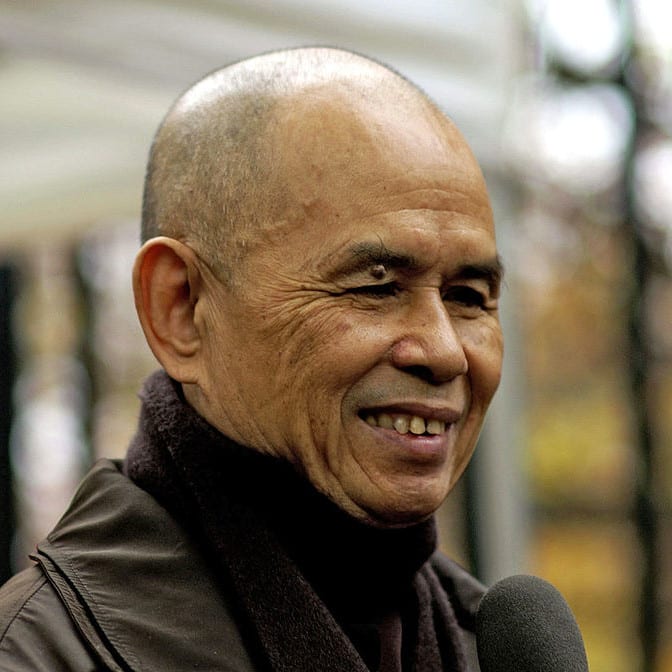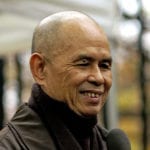Following are Thich Nhat Hanh’s closing remarks to over two thousand people attending his Day of Mindfulness at Spirit Rock Center in Woodacre, California, in October 1993.
My dear friends in California, happiness is not something you get from outside. To me, happiness is born from peace. With the practice of mindfulness we can calm our body and our mind. Then peace and happiness become possible. The Buddha body is in us. Using the energy of mindfulness we can touch the body of the Buddha within us and around us at any time. And I know the sangha body is in me and around me. The trees, the grass, the blue sky, the flowers are all elements of my sangha. And you are my sangha body. You take care of me.
In Vietnam, we used to say, “When a tiger leaves his mountain and goes to the lowlands, he will be caught by humans and killed.” When a practitioner leaves his or her sangha, at some time she will abandon her practice. We have to take refuge in our sangha, our community of practice. We cannot continue our practice very long without a sangha. The art of sangha building is crucial to our practice.
Do not look for a perfect sangha. Stick to the one you have and try, with your practice and your joy and peace, to improve its quality.
If a sangha is available in your area, please keep in touch and take refuge there. If the sangha doesn’t have the quality you expect, don’t abandon it. Do not look for a perfect sangha. Stick to the one you have and try, with your practice and your joy and peace, to improve its quality. This is very important.

If there is no sangha available where you are, then practice looking deeply in order to identify elements of your future sangha around yourself. Members of your sangha may be your child, your partner, and a beautiful path in the wood. The blue sky and the beautiful trees are also members of your sangha. Please use your talent and your intuition to create a sangha for your own support and practice. We all need a sangha very much.
Our practice should be supported by the people around us, and we can learn how to support them in return. We support them by looking deeply so we can recognize the seeds of peace, joy and loving kindness in them. We touch these seeds, we water these seeds every day in order to make other persons bloom like flowers. And when these persons bloom like flowers, we all become happier. We have to help each other in our practice. The practice of meditation is not an individual matter. We have to do it together.
The Buddha, Shakyamuni, our teacher, predicted that the next Buddha would be Maitreya, the Buddha of love. We desperately need love. And in the Buddha’s teaching we learn that love is born from understanding. The willingness to love is not enough. If you do not understand, you cannot love. The capacity to understand the other person will bring about acceptance and loving kindness.
It is possible the next Buddha will not take the form of an individual. The next Buddha may take the form of a community, a community practicing understanding and lovingkindness, a community practicing mindful living. And the practice can be carried out as a group, as a city, as a nation.
We know that in the spirit of the Lotus Sutra we are all students of the Buddha, no matter what tradition we find ourselves in. We should extend that spirit to other traditions that are not called Buddhist. We can find the jewels in other traditions—the equivalent of the Buddha, the dharma and the sangha. Once you are capable of seeing the jewels in other spiritual traditions, you will be working together for the goals of peace and brotherhood.
We have to help each other in our practice. The practice of meditation is not an individual matter.
We should include everyone in our practice. Use your talents, your creative ideas. Organize a day of mindfulness in such a way that children love it. Many children who have come to retreats in North America have had a joyful time. And parents become happier when they see the children happy. Organize a day of mindfulness in such a way that our friends enjoy it and want to practice more and more. One day of mindfulness can bring about a lot of peace, friendship, understanding and love.
My friends, once again, you are my sangha body. I offer you all my support and wish you very strongly to take care of the sangha body which is our refuge. I take refuge in you, my sangha.
This article originally appeared in Inquiring Mind. It is shared here under Creative Commons Attribution-NonCommercial-NoDerivatives 4.0 International.







